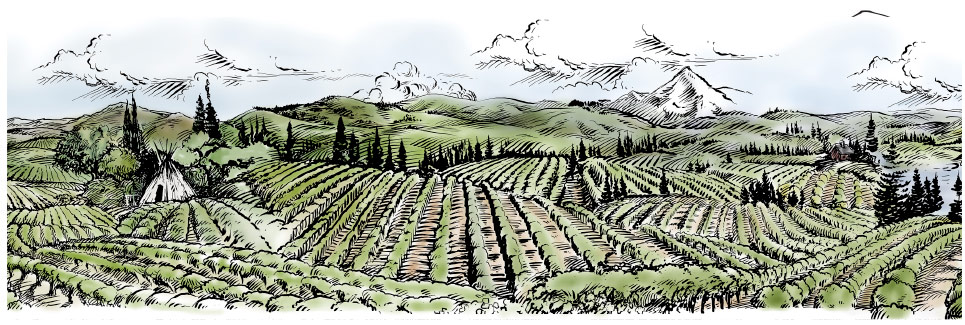Big fish, small pool: why being the best wine isn’t always so hot.
He Said...
- Mike Willison
I very recently came across a bottle of wine that bore so many little gold medal icons on its label that it looked like that iconic photo of Mark Spitz after the 1972 Olympics without the moustache and spectacular bathing costume. My first impression was one of a kind of unknown reverence for achievement not unlike hearing that someone holds a doctorate degree, but in Phys. Ed., or Blacksmithery, and from an online university. "How impressive, I think. Wow, right?" I mean, should Pabst really still be peacocking about the blue ribbon they earned in 1893 at the World’s Columbian Exposition? A more deserving blue ribbon might go to you readers that knew that the event was held during the Grover Cleveland administration. Two blue ribbons if you can name his VP.
It seems that the modern day wine competition is a bit like modern day little league. True competition has been replaced by a kind of careless socialism wherein all of the best players stop caring because they aren't allowed to excel and thereby smite the egos of the less talented, and the worst players are all permitted to exist in a fantasy land wherein they are as excellent as Albert Pujols and get 11 strikes before they just get to go to first base. Ultimately, no one is keeping score and everyone either goes home a winner or, for the more cynical at heart, a loser. Double Gold, Gold, Silver, Bronze, Best of the Best, Outstanding, Exemplary, Notable, Neat-Looking, Explosively Mediocre, Fine; one can win a medal for just about everything at a wine contest, and usually does.
The question must also be asked, "Who was entered in this thing?" The answer usually is, "A bunch of people desperate for some kind of positive, marketable plaudits to sell to people impressed by sparkly things." Very rare is the competition that piques the interest of the best producers, like the Decanter World Wine Awards. More often than not the competitions are designed to draw in the locals, showcase smaller, folksy producers, and lure one of the regional showcase wineries into the competition to give it a bit of believability, thereby creating a viable, sustainable event for the sponsors and producers.
If, as a matter of coincidence, the winning wine happens to be one that you enjoy, thank the grower and winemaker, they did all of the hard work and make a wine you find appealing. Don't bother heaping praise on the judges of the competition, who are likely holding very impressive credentials in the field of wine-judgery, who I'm sure were cobbled together like a posse in the old west, or the wines at the competition: representing the best of what we could muster up.
She Said...
- Carrie Kalscheuer
I'm not in love with the idea of anything used solely for marketing purposes. There must be viability to the outcome in order for me to be on board as a rule. Any competition held exclusive of the so-called "best players" doesn't qualify, in my opinion. And that is often the case, as you mentioned. I, too, am frustrated by arbitrary gold medals and “best in show” awards. It’s all beginning to look like Little League these days where every kid gets an award just for showing up. But you’ve only touched on the greater issue – that larger international competitions like the Decanter World Wine Awards – can make a significant difference not just in the marketing schemes of the individual winery, but in the wine world as a whole.
Consider what is now famously referred to as The Judgment of Paris: the 1976 Paris Wine Competition. Without this game-changing competition, American wine may not have achieved the status that it currently has, or this may have been at least delayed by many years. Already behind the game thanks to Prohibition, Napa’s win in this competition may very well have saved the industry as a whole. What it certainly did was pave the way for other wine regions around the country to succeed on a global scale.
Each wine region has their own story of glory on the competition front and, although none have achieved the status of the above example, that isn’t to say they have no merit, or at least the potential for merit. Again, it’s up to both wine professionals and more importantly, the consumer, to weed out the b.s. and not be swayed by a pretty blue ribbon tied around a bottle (or can as it may be).

